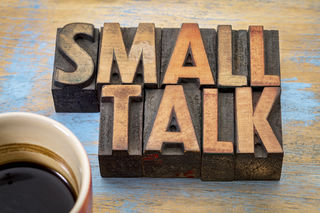Happiness
Why Small Talk Is a Big Deal
The ability to engage in small talk is an underrated social skill.
Posted January 18, 2020 Reviewed by Davia Sills

Do you dread trading niceties with retail clerks and assorted other strangers when you are out in public? Do you go out of your way to avoid neighbors and co-workers so that you do not have to engage in idle chitchat about the weather and other equally inoffensive topics? Does your blood run cold when you receive an invitation to a cocktail party?
If this sounds like you, then you have an aversion to small talk.
Small talk is defined by the Oxford English Dictionary as “Polite conversation about unimportant or uncontroversial matters, especially as engaged in on social occasions.”
Some people hate small talk because they perceive it as a waste of time and as an impediment to a meaningful conversation; others may hate it simply because they are not good at it.
How you feel about small talk depends to some extent on where you are from. Stereotypically, Americans are more tolerant of small talk than people from other places and expect to encounter it in social situations. Scandinavians, on the other hand, are more comfortable with awkward silences than with awkward small talk, and the British TV show Very British Problems devoted an entire episode to the excruciating tactics that many Brits will resort to in an attempt to avoid small talk.
There are also consistent gender differences in how small talk plays out. While everyone likes to talk about the weather, women are also likely to compliment each other’s clothing and appearance, whereas men are more likely to employ playful insults. In both cases, people are signaling a desire to establish a mutually comfortable level of involvement in the conversation.
Is There a Downside to Small Talk?
Many critiques of small talk reference a demonstration organized by Duke University Psychologist Dan Ariely as evidence that there might be some real advantages from banishing small talk from our daily lives.
Ariely arranged a dinner party for 27 guests with the following rule: No small talk allowed!
All guests were required to arrive at exactly the same time, and the hosts provided index cards with meaningful conversation starters. The guests were required to police their conversations by sounding the alarm and changing direction if they perceived that the conversation was drifting in the direction of small talk. The party turned out to be a rousing success, and those in attendance confirmed that it was one of the most interesting and stimulating social events that they had ever attended.
Small talk haters are also quick to cite a study by psychologist Mathias Mehl and his colleagues, published in Psychological Science in 2010. In Mehl’s study, 79 undergraduate students wore an electronic device that recorded 30 seconds of sound every 12.5 minutes for four days. Afterward, all of the captured conversations were categorized as either small talk or as substantive, meaningful conversation. His participants completed a battery of questionnaires designed to measure happiness and well-being, and it turned out that higher levels of well-being were associated with less small talk and more substantive conversation.
One of the conclusions that many drew from these results was that engaging in small talk diminishes one’s well-being.
However, Mehl repeated the study in 2018 with a much larger sample and a more sophisticated analysis of the data, and this time concluded that small talk does not undermine happiness and that it is associated with more happiness than one usually experiences when one is alone. In other words, it is better to engage in small talk than to engage in no talk at all. The results of the earlier study apparently reflected the strong positive effect that meaningful conversation has on happiness rather than any negative effects of small talk.

Small Talk as a Social Skill
In recent years, small talk has been belatedly recognized as a beneficial feature of everyday life. For example, studies indicate that people are happier when they talk to others, even if it is just strangers on a subway, and even if it is just small talk.
The problem with many previous discussions of small talk was a framing of the issue as a contest between the benefits of small talk versus the benefits of deeper conversation as if people must be forced to engage in only one or the other.
The trick is to be skillful in the use of both types of talk in your social interactions. Rather than being antagonistic to each other, these different types of talk are strategies that work in tandem to create effective relationships.
Yes, of course, you are bound to be disappointed if all of your conversations are nothing more than superficial loops of chatter about things that no one really cares about; but the skilled conversationalist knows how to use small talk as a social lubricant and as a segue to deeper topics. Think of small talk as a tool that negotiates and defines a relationship. It can be a way of synchronizing the level of intimacy felt by each of the partners in the conversation and a way of signaling friendly intentions while simultaneously minimizing awkward, uncomfortable silences.
The actual topics of small talk do not matter very much; its purpose is not to convey information, but rather to serve as an opening act to warm up the audience for the meaty stuff to follow.
In short, being adept with small talk is an important component of your arsenal of social skills. Knowing when to initiate small talk and also knowing when to move on and escalate the level of discourse beyond the mundane will make you a popular conversational partner.
And always be careful not to overstep the level of intimacy inherent in a situation, especially when the small talk strays into the realm of personal topics such as health or physical appearance.




